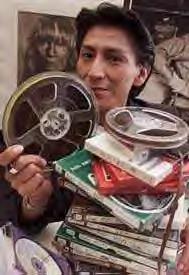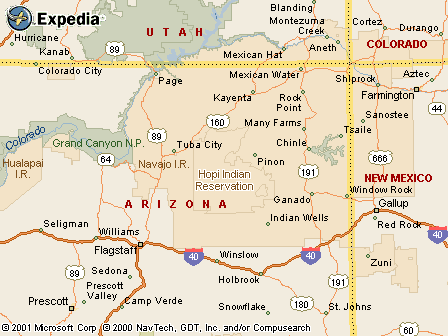|
|
Canku Ota |
|
|
(Many Paths) |
||
|
An Online Newsletter Celebrating Native America |
||
|
October 6, 2001 - Issue 46 |
||
|
|
||
|
Old Songs of the Hopi Kept Alive |
||
|
by Judy Nichols The Arizona Republic-Oct. 02, 2001 |
||
|
photo by Tom Tingle/The Arizona Republic |
 The sounds sift
into the recesses of Leland Dennis' brain, searching for a foothold of recognition. The sounds sift
into the recesses of Leland Dennis' brain, searching for a foothold of recognition.It is there, somewhere. If only he can concentrate hard enough. Then it comes to him. It's a Hopi lullaby his grandmother used to sing, a story about the hohoyo'u, or stink bug, how it helped its brother stink bug, carrying it around on its back. "It had stayed in my head," said Dennis, the Hopi community scholar for the Museum of Northern Arizona in Flagstaff. "But I didn't know the whole song, not word for word." Dennis was listening to the music on a newly burned CD, but it had the scratchy, ghostlike sound of its original recording, silent for decades, nearly lost forever. The lullaby is a tiny part of nearly 800 hours of songs, chants and conversations with Hopi elders that were recorded by ethnographers and anthropologists during the 1940s, '50s and '60s. They include calls to grind corn, plant corn for the chief or even get a burro out of the mud. For years, the tapes were stored in boxes at the museum, decaying and becoming so fragile that museum employees were afraid to put them on a tape deck. "One expert looked at them and said, 'Don't ever play these,' " said Michael O'Hara, associate librarian and archivist. Too late, the museum learned the tapes should be unwound and rewound once a year to keep the magnetic particles from migrating and to keep the tape edges from compressing. With a $17,000 grant from the Arizona Humanities Council, the Target Foundation and the Delmas Foundation, the museum hired a Boston firm to transfer the tapes to digital audiotape and CDs. "One of the tapes broke three times when they played it," O'Hara said. The recording speed of the tapes sometimes changed in midstream. Some were recorded at odd speeds as batteries wore out, and some stopped in midsentence. "It was a good thing we went to professionals," said Evie Pazmanczyk, the project coordinator. Now the material, in an easily accessible format, will be available to museum visitors, used in exhibits and given to the Hopi tribe. The digital tapes and CDs should last at least 10 years. "Archivists would like to have a permanent solution," O'Hara said. "But we may never have that. It may be a continual shuffle to a new medium." The tapes were made by Homer Diehl, who worked for the Soil Conservation district; Alfred Whiting, an anthropologist; David Seaman, a linguist retired from Northern Arizona University; and Barton Wright, an expert on Hopi and Zuni kachinas. But the bulk were recorded by Robert Black, a graduate student at the University of Indiana in the 1940s and who recently published a book using the tapes, titled Standing Flower. Pazmanczyk said some of the tapes included ceremonies and information of a private or religious nature that Hopis believe should be heard only by initiated tribal members. Those portions have been edited out of the publicly available version and given to the tribe. "Anthropologists wanted to record everything, and the Hopi were accommodating," O'Hara said. "But sometime later, they felt they were betrayed when some of these things were revealed to the public. "They are treading a fine line to ensure the chants and songs are preserved and, at the same time, respected." For Dennis, raised speaking Hopi to his grandmother, translating the tapes revealed a rich, more complex language than he remembered. Dennis said the designated chanter traditionally would climb on a high hill in the village and summon other tribal members with "Aliska," or "listen up." Then he would begin to chant. "One chant on the tape is about a rabbit hunt," Dennis said. "It tells the women to prepare food and gather water for the next couple of days. It talks about which direction they will go, how long they will stay." Another tape includes tribal leader Thomas Banyaca repeating a speech he made to Congress in 1952. Different dialects reveal where the speaker was from, First Mesa, Second Mesa or Third Mesa," said Dennis, who is helping translate and transcribe the recordings. "Occasionally there were words I'd never heard, and I had to break them down." For Dennis, the listening is bittersweet. He's excited that some of the lost songs could be used for today's buffalo or butterfly dances. But when he goes home to Third Mesa and speaks to elders in Hopi about some of the words he doesn't know, they answer in English. "I keep at it until they speak Hopi to me," he says. And though he now has reclaimed his own memories and knows all the words to the stink bug lullaby, he can't sing it for his grandmother. She has lost her hearing. |
|
|
|
Hopi |
|
|
||
|
|
||
| Canku Ota is a free Newsletter celebrating Native America, its traditions and accomplishments . We do not provide subscriber or visitor names to anyone. Some articles presented in Canku Ota may contain copyright material. We have received appropriate permissions for republishing any articles. Material appearing here is distributed without profit or monetary gain to those who have expressed an interest. This is in accordance with Title 17 U.S.C. section 107. | ||
|
Canku Ota is a copyright © 2000, 2001 of Vicki Lockard and Paul Barry. |
||
|
|
|
|
|
The "Canku Ota - A Newsletter Celebrating Native America" web site and its design is the |
||
|
Copyright © 1999, 2000, 2001 of Paul C. Barry. |
||
|
All Rights Reserved. |
||

